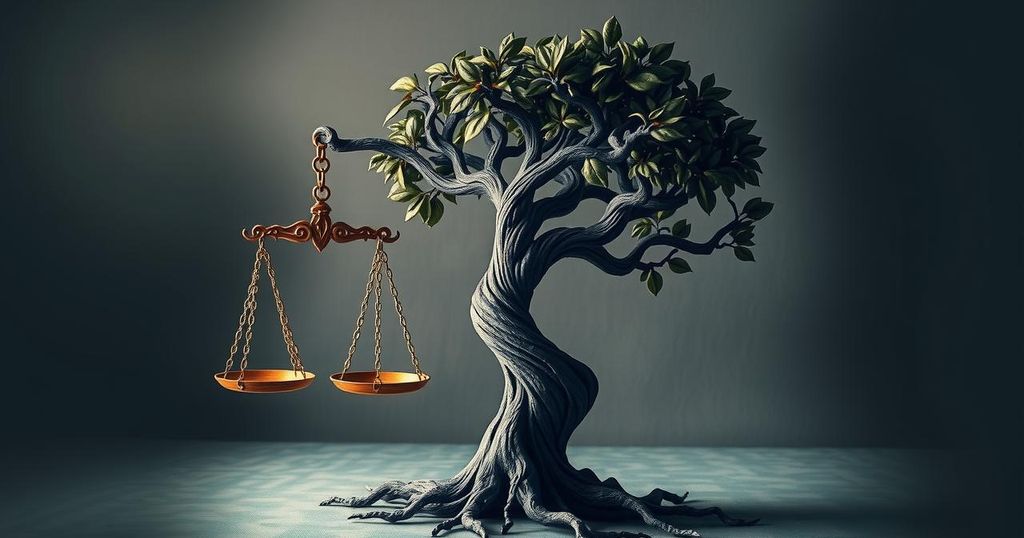Edgardo Aló’s Stand Against Femicide Reversal in Argentina
Edgardo Aló continues to advocate for justice after his daughter, Carolina, was brutally murdered in 1996. His efforts led to significant legal reform recognizing femicide in Argentina’s penal code. However, the current government under President Javier Milei threatens to erase these protections, prompting outrage among activists who fear increased danger for women.
Edgardo Aló cannot forget the night he last saw his daughter, Carolina, who was only 17 years old. She had been under pressure to leave her abusive boyfriend, but after she failed to return home, Edgardo grew worried. Unfortunately, Carolina was found murdered at the hands of her boyfriend, Fabián Tablado, who stabbed her 113 times a week prior to her 18th birthday. This tragedy marked the beginning of Edgardo’s relentless fight for justice against gender violence.
For decades, Edgardo sought legal action to honor Carolina’s memory, advocating for the acknowledgment of femicide as a severe form of homicide. His efforts, supported by women’s rights organizations, culminated in 2012 with the Argentine government modifying the penal code to classify femicide as an aggravating factor in homicides. However, a resurgence of concerns arose following recent statements from the current government under President Javier Milei, which threatens to reverse these legal protections.
On January 24, 2024, Justice Minister Mariano Cúneo Libarona announced plans to remove femicide from the penal code, arguing that it distorts true equality before the law. This assertion has garnered criticism, with many perceiving it as a political move undermining women’s rights. The president questioned the validity of treating killings of women differently, asserting that such a classification deems women’s lives more valuable than men’s.
Critics, including human rights advocates, argue that disregarding femicide fails to recognize the unique and often intimate nature of gender-based violence. Notably, studies show that most women victims are killed by individuals close to them, a factor that necessitates specific legal responses and protective policies. Experts assert that without understanding the unique dynamics of femicide, effectively addressing and mitigating this violence would be next to impossible.
Statistics reveal a harrowing reality; from January to November 2024, Argentina recorded 252 femicides, with a majority occurring in the victims’ homes and perpetrated by someone they previously knew. In the past, legal penalties for gender-based violence were inadequate, leading Edgardo to advocate for a more stringent judicial response after his daughter’s brutal murder.
Edgardo’s prolonged efforts resulted in a crucial legal victory, where femicide was defined in the penal code, significantly increasing the punishment for such crimes. Nonetheless, the recent government actions pose challenges to the progress made over the years, leaving Edgardo and many advocates feeling disheartened. Measures to diminish support for gender violence victims indicate a regression in protections which were hard-won through relentless campaigning.
Despite enduring continued threats from his daughter’s killer, who has been released on parole, Edgardo remains vociferous about the perilous intersection of political policy and women’s safety. Living under constant threat, holding an anti-panic device, and reserving a seat at the family table for Carolina every holiday, he embodies the fractured psyche of loss and the ongoing battle against gender violence in Argentina.
The struggle against femicide in Argentina began prominently after the tragic murder of Carolina Aló in 1996, prompting her father, Edgardo, to become an advocate for legal reform. Over the years, the push for recognition and punishment of femicide as a unique crime gained traction, resulting in significant changes to the penal code by 2012. However, recent developments under President Javier Milei’s administration have raised concerns that these advancements are under threat, sparking outrage among women’s rights activists and the community at large.
Edgardo Aló’s journey exemplifies a father’s heart-wrenching quest for justice and the ongoing battle against femicide in Argentina. The recent pullback on legal protections has left many advocates feeling dismayed, as the government’s actions could jeopardize the safety of countless women. With the rise in femicides and ever-present threats to survivors, it is paramount that Argentina’s legal framework prioritizes the protection and dignity of women’s lives to effectively combat gender-based violence.
Original Source: edition.cnn.com








Post Comment